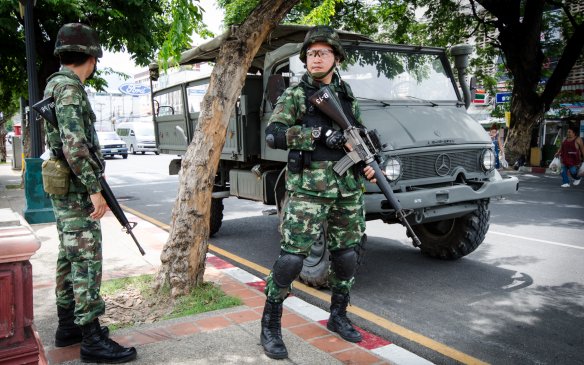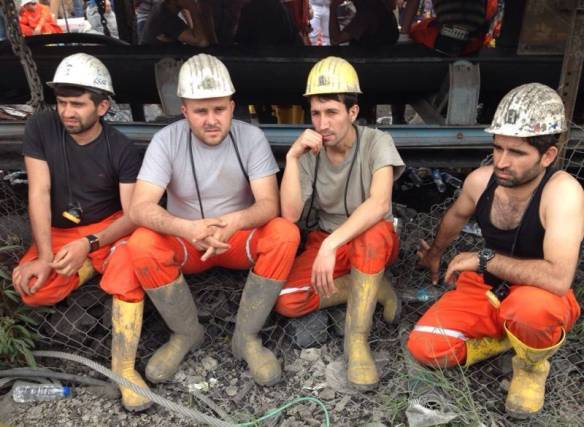Monday 26 May South Sudan army denied involvement in assaults on UN staff. The Russian President, Putin, was invited to visit South Sudan. Tuesday 27 May UNHCR announced that more than 70,000 people have fled their homes since the peace agreement was signed 9 May. UNMISS’ mandate was extended and the focus shifted from nation building to protection of… Read more »
The price of fast-track peace-making: Considering May 2014
May 2014 appears to be a momentous month for South Sudanese politics. The government signed two peace agreements on 9th May in Addis Ababa, and the South Sudan Humanitarian Conference took place on 19-20th May in Oslo. Mobilising over USD610, the Oslo conference was a response to the crisis induced by the continuing conflict in South Sudan. Although presented… Read more »
Thailand’s Fragile Democracy

Thai military at Chang Phueak Gate in Chiang Mai. Photo (c) Takeaway/ Wikimedia Commons, used under CC BY-SA 3.0.
The traditional elite clings to an outdated world view. But a military coup offers no solution.
Two days after the military coup in Thailand at least 13 bombs exploded, approximately simultaneously, in the city of Pattani. Three people, including a five-year-old child, were killed, and approximately 60 people injured. On Sunday there were clashes between anti-coup demonstrators and soldiers in Bangkok and Chiang Mai. A symptomatic feature of Thailand’s enduring power struggle is a failure to address the country’s underlying political conflicts. With last week’s military coup, the Thai army has once again put the country in a precarious position. Thailand, which most Norwegians know as a peaceful and beautiful holiday paradise, is in a state of extreme political tension that carries a significant risk of long-lasting violent conflict.Read More
This Week in South Sudan – Week 21
Monday 19 May UNICEF called for financial aid to stop outbreak of cholera in South Sudan. South Sudan government defended involvement of foreign troops in South Sudan. SPLM/A-in-Opposition accused the South Sudan government of raping women in Upper Nile. An international Donor Conference for South Sudan opened in Oslo. Tuesday 20 May Khartoum stated that… Read more »
The Soma Mining Disaster: A Tragedy Foretold
As the rescue operation into Turkey´s worst industrial accident came to end on Saturday, 17 May, the number of dead was confirmed at 301 (of 787) with scores still unaccounted for. PRIO researcher Pinar Tank has published a post the New Middle East Blog 23 May 2014.

Miners in Soma, waiting for news from the mines. Photo: Wikipedia
Democracy, Democratization, and Political Violence
The process of democratization is often violent in the short run, and democratic governments are more constrained in their use of force against insurgents than non-democratic authorities. But are democracies really more prone to political violence than other political systems? This is the theme of a short article published at the International Relations and Security Network (ISN) at ETH Zürich.Read More
Business and Peace
These days, the Business for Peace Symposium is happening in Oslo. Business leaders from all over the world are gathered to discuss how business can contribute to peace and hinder conflict. Some of the most distinguished guests have arrived from Cyprus, namely Manthos Mavrommatis, Honorary President of the Cyprus Chamber of Commerce and Industry and Vargin Varer, Vice President of the Turkish Cypriot Chamber of Commerce.Read More
Edward Snowden: the last Big Brother?

openclipart/user unknown. Public domain.
Following last year’s revelations, Edward Snowden seems to be trapped in a role ironically reminiscent of another famous character – George Orwell’s Big Brother.
You are being watched. This classical surveillance slogan hides a subtler, and more insidious message: you must believe you are always being watched, and you probably are, but you will never be certain of that, or get the full picture of how. That is the logic behind the motto. And on this logic relies the functioning of surveillance’s ghostly dynamics: a logic of uncertainty and fear….
Read more in the original article that was published 13 May 2014 at Open Democracy.
Electing India’s Future

In April, 800 hundred million people began casting their ballots all across India in the largest election the world has ever seen. When we think of voting in India, we often picture a poor elderly villager showing a big ink-stained thumb and boasting a wide smile as proof of democracy in action. But elections in today’s India mean big money, big ideas and a growing focus on big urban centers as the drivers of development that will continue to catapult it from a 20th century agrarian laggard to a 21st century global power.Read More
Lethal Autonomous Weapons: Issues for the International Community

Original photo source: E&T
On May 13-16 a United Nations (UN) expert meeting will discuss ‘questions relating to emerging technologies’ in lethal autonomous weapon systems. Such systems are distinguished by being mobile and selecting targets autonomously without direct human supervision. This type of expert meeting represents the lowest rung of the UN ladder. The Chair of the meeting will simply write up a report to be presented later in 2014 to the annual discussions by States on the Convention on Certain Conventional Weapons. But the expert meeting in May could be the start of a process which might see the development of new national and international law to regulate or prohibit the use of artificial intelligence without human supervision in weapon systems. Read More